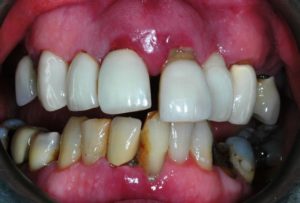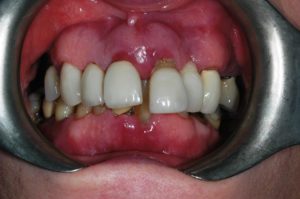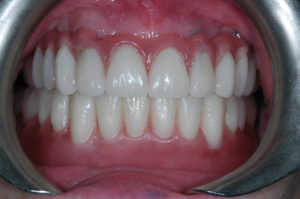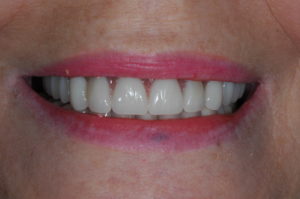A dental implant is an excellent way of replacing one or more teeth. It consists of two parts, a titanium screw that is placed into the jawbone and a porcelain crown that is fitted directly to it.
The dental implant titanium screw can be fitted either at the time of the extraction (an immediate placement) or later on as part of a minor surgical procedure. Once the screw is in place it must be left for several weeks to allow it to integrate fully with the jawbone. Once it is fully fused in this way it becomes incredibly strong and can support either one single crown or multiple units as part of an implant supported bridge. The crown is usually screwed in place and can be removed easily at a later date if required.
Implants can be used to replace a full set of missing teeth by supporting a denture or a full arch of fixed bridgework. Both of these techniques can provide a very comfortable set of teeth to chew with, which can literally be life changing for many patients.
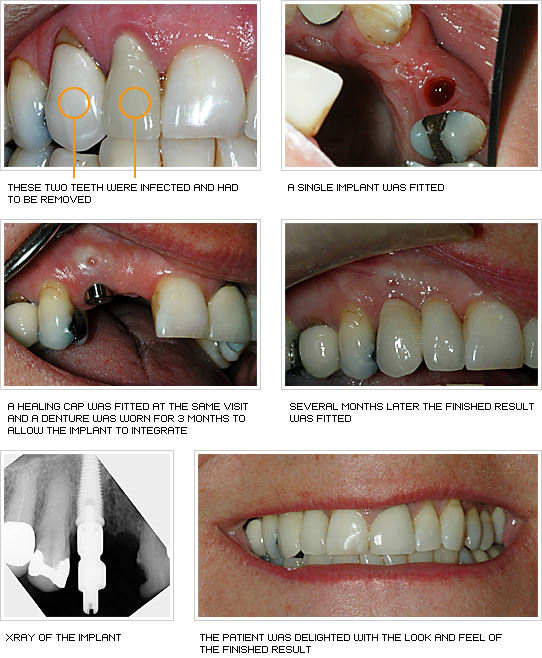
Please also see our All On 4 Implant page for more information
Frequently Asked Questions
Does it hurt?
Placing an implant, either at the time of the extraction or later on, is a remarkably comfortable procedure. Most patients report little or no pain the next day and only very minor swelling around the placement site.
Do I need a general anaesthetic?
The vast majority of implants are placed under local anaesthetic in the dental surgery. For some more complex procedures where the patient has lost a lot of bone in the jaw then they may need a general anaesthetic, which would be done in hospital. (In these cases bone from the hip or rib is taken to replace the lost jawbone).
Will they last forever?
Implants are possibly the most successful type of restoration that we do in dentistry, with very good long-term studies lasting 25 years. The success rate for integration is over 95% and the success rate at 10 years is between 85 and 95%. Obviously failures can and do occur, the most common one being loosening of the implant by infection destroying the bone around it. This infection is called ‘peri-implantitis’ and is seen more commonly in implants that are not kept clean and in smokers. Failure rates are higher generally in patients who smoke, drink more than 20 units per week, have diabetes or suffer from active gum disease.
Why do they cost so much more than a normal crown?
Implants can cost as much as £2,000 per tooth making them much more than a normal crown. This cost reflects the extra work involved, usually 5 visits for one single implant, the extra training required to be able to undertake implant work and the high laboratory costs of the implant and the crown that attaches to it. Implants represent a very good long term bet and can provide many, many years of successful integration, making them a very cost effective solution to a missing tooth. For more information on prices please see our Implant Fees page
Can’t I just go abroad and have the work done for much less?
There are a number of clinics offering this work in Eastern European countries such as Hungary and the Czech republic. Obviously the cost of living is much less in these countries so they can do the work for less. The problem, always, when having surgical work done abroad is if there are complications with the procedure. Even simple cases can take several visits, which can mean several trips abroad, making the savings a lot less. If there are problems with the implants then it is not easy to see someone about them at short notice. The best approach is to work with a team that you know and trust and can access at short notice should there be any problems.
If you would like to find out more about implants and how StoneRock can provide them for you please call the practice on 01580 752202 and we will be happy to discuss them with you.
Download a PDF of this page by clicking here.
(Requires Adobe Acrobat Reader – download it for free by clicking here)
For more information or to book an appointment at our dentist practice in Hawkhurst Kent please contact our Reception Team on 01580 752202 or info@stonerock.co.uk and they will be very happy to help.
